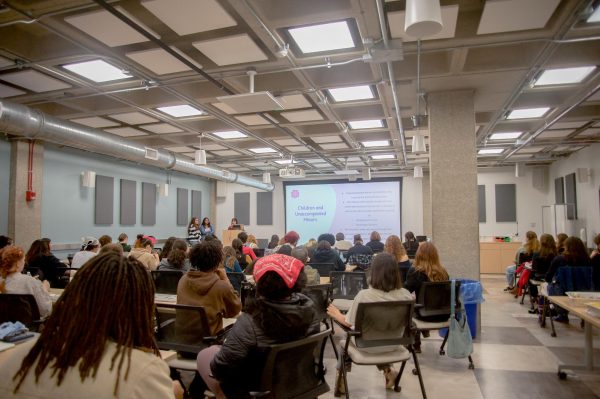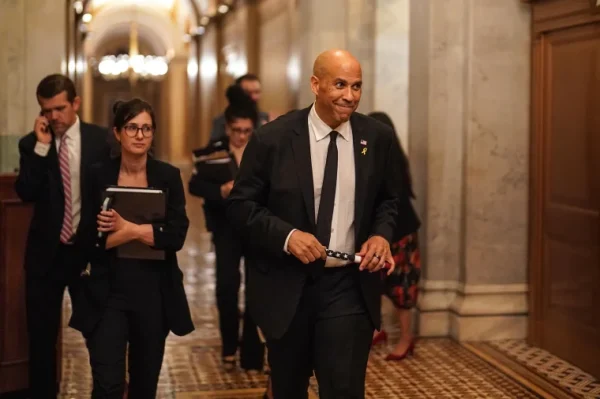International Students Excluded, A Symptom of Systemic Exclusion from STEM
Editor’s Note: On March 10, after this article was published, Director of Fellowships and Awards Nick Petzak wrote in an email to Ritesh Isuri that upon further review, no language in the fund agreement for the Nexial Prize was found that specifically excludes international students. As such, five years after the prize’s creation, international students can be nominated this semester and in the future.
“CONGRATULATIONS”
I remember stripping open my admissions packet only a few years ago to see this word in a big, blue font welcoming me to Oberlin. In that package was a page dedicated to a new award for graduating seniors, the Nexial Prize, that Oberlin had decided to launch. A friend of mine beside me at the time took a glance at the piece of paper, saw STEM and cultural exploration, and immediately said, “Ritesh, you are going to win this.” I remember responding that while I may have had many accomplishments in high school, nobody would know me in Oberlin; I didn’t think I could ever win anything.
That all changed, though — through my time at Oberlin, I got involved in different organizations and actually began to believe I could win such an esteemed award. However, in my excitement, I forgot that Oberlin would always find a way to make me feel unwanted. As nominations for the Nexial Prize opened up last week, I got an email telling me that as an international student, I would not be eligible to apply for the award.
“The Nexial Prize is a $50,000 award made annually to the member of the graduating class who, in addition to demonstrating excellence as a science major, has also stood out with a serious pursuit of the study of culture,” wrote a member of the Oberlin College communications staff in 2017.
The prize you are describing, Oberlin, is not inclusive of everyone. You should not make it sound like it is. A better description would have been, “American member of the graduating class” — or, even more precisely, based on previous winners, “white American member” — unless you do not consider international students to be part of the Oberlin family. It is sad to see that an alumnus funding a prize for STEM students with a serious pursuit of the study of culture would not include international students. Oberlin, on ne peut avoir le beurre et l’argent du beurre — either be fully inclusive or describe your prizes for what they are!
During my whole time at Oberlin, I have never heard of this eligibility requirement for the Nexial Prize. My professors had previously talked about nominating me for the award, and when I recently informed them of the eligibility requirement, some professors were even more shocked than I was. No one had heard of such a rule, and we were all angry at the school’s decision to disregard me as a candidate. At Oberlin, I have been fortunate enough able to merge my passion for Chemistry/Biochemistry and French together. My French professors have worked with me throughout my time at Oberlin in order to learn about science writing in French — something that is not normally taught in classes here. Over the years, I have mastered the science vocabulary in French. Last semester while I was in Ruberta T. McCandless Professor of French Matthew Senior’s class, I got to bring my expertise as a scientist to the study of plague narratives in French, combining both of my passions in one class.
I did not stop there, however. I wanted to bring the STEM and humanities departments together, so I organized lectures where professors and I would talk about the intersectionality between different STEM and humanities courses, thereby bridging the gap between the two fields. I could very well have not won the Nexial Prize anyway, but I think I deserve a fair chance to be nominated at the very least!
For so many years I’ve seen my friends getting through the process of applying for fellowships and awards, finding themselves among the finalists but never winning anything. It should get you thinking: After all these years, we must have data about what leverages certain people keep having in their applications compared to BIPOC students. We should ask ourselves if those advantages arose from previous experiences that stem from having more money or privilege — and then provide those advantages to BIPOC students. Oberlin is not and will not be equitable in its choices for fellowships until it can do that!
Oberlin claims to be committed to equity in learning and labor. Yet, as it stands, the whole system seems more like promoting white learning using BIPOC labor. Oberlin is an institution that promotes learning by extracting labor from and exploiting its most vulnerable and marginalized students. This learning is built on the backs of people like me who are responsible for supporting so many STEM students, many of whom are white and wealthy, through intro-level STEM classes, which really are brutal sorting pools. Specifically, as a teaching assistant, I know I have gone above and beyond to make sure my students are leaving labs having learned something. I have always put extra effort into explaining to students how a particular lab instrument works, into teaching them how to interpret their results so that they can finish their reports easily, and I have continuously brought additional tools that can help their understanding of a particular lab. I was the only TA that I know of who conducted all of this additional unpaid work because I wanted to foster a community of learning while providing a safe space for our underrepresented students.
Have my efforts ever been acknowledged by the department? No! Do students of my lab and of other labs reach out to me to thank me for making STEM easy for them? You bet!
Being the only student of color on the Biochemistry Committee has also yielded me many uncomfortable situations. Oberlin has always spoken on having and appreciating a so-called “teamwork spirit.” Because of this, however, I have always been told to use “we” when discussing a project, even if I was the only one working in a team — I’m tired of it! Last year, the Chemistry department decided not to host its seminar series. But knowing that it is an important part of our learning, I decided to bring it back, taking it upon myself to gather scientists from not only across the College but the country as well to speak on their work, something I continued this semester as well. I have single-handedly managed the whole thing, and I still kept using “we” when referring to the effort that went into organizing it — but no longer. Oberlin, every time you congratulate the committee for work I have done all alone, you are just giving the other white members credit for the work your brown student has done alone.
As a first-generation college student who recently applied for graduate school, I was surprised to see how much my friends already knew about the application process. I was still struggling to figure things out, which is why I have put together a panel for students who will be applying to graduate school next year so that they do not have to go through this whole ordeal blindly. I was surprised by how little support the department offers.
It should infuriate you to know that the Chemistry department has had only ONE tenured female professor in its history. (Two others have been offered the position, but they did not stick around). For a college that considers itself to be so progressive, the facts really just point to the contrary!
Do not get me started on the Physics department; it is one of the most sexist and racist departments I have ever seen. There are professors who would refuse to use students’ correct pronouns — despite displaying them as part of their names on Zoom! I stopped asking questions or participating in class because I did not want to be misgendered. Oberlin, I know you do not care about my mental health, but you are liable if my learning is hindered. To prove my point about the whole department fostering a racist environment: All STEM departments in Oberlin have been invited to participate in a Departmental Action and Reflection Team, where the Howard Hughes Medical Institute is funding a guest speaker to allow for dedicated time to work on Diversity, Equity, and Inclusion. The program involves hiring a new professor who would teach in the department and complete a report on racial bias and on what the department can do to be better. Physics is the only STEM department not participating in the program. The whole thing is fully paid by HHMI, so the department literally had nothing to lose! Oberlin, if a whole department is neglecting an opportunity to examine its biases, you should intervene!
That being said, I want to acknowledge professors who I personally know are trying to make STEM more inclusive at Oberlin. I can never thank Assistant Professor of Chemistry and Biochemistry William Parsons enough to have taken me into his lab as an Oberlin College Research Fellow at a time when I had no previous research experience. Through her PERSIST program, Assistant Professor of Chemistry and Biochemistry Lisa Ryno is fostering a whole new community where underrepresented students in STEM can build their science identity. Professor Ryno is setting a new standard for what a professor should be! I still remember how after getting my graduate school offers, Assistant Professor of Chemistry and Biochemistry Rachel Saylor sent me an unprompted PDF laying out questions I should be asking before deciding which PhD program to join — it does not take a lot to be a caring professor! If you cannot back it up with humanity, your PhD means nothing.
You might be wondering why I’m saying these things now. I’ve discovered how Oberlin silences its students using impostor syndrome, making you believe you aren’t worth it so that you constantly doubt yourself. It then becomes difficult to not notice the racist actions of professors as such, especially when you have people telling you you’re crazy for even thinking people at Oberlin could be biased. Having gotten into fully paid PhD programs in chemistry from the Ivy Leagues and other graduate schools ranked in the top 10 in the U.S., I no longer need validation from old white men at Oberlin. I now know my worth, and you cannot tell me otherwise!
There are so many stories from different departments about different ways that they have been non-inclusive, but Oberlin does not provide us with the space to actually talk about it. Let’s provide ourselves with this space. Share this article with a personalized anecdote, as much as you are comfortable with. Let Oberlin know about the times you felt your department was being non-inclusive and about your experiences — good or bad, we can all learn from it. Let your friends know and learn together about how we can all be allies, especially at a school as problematic as ours.



